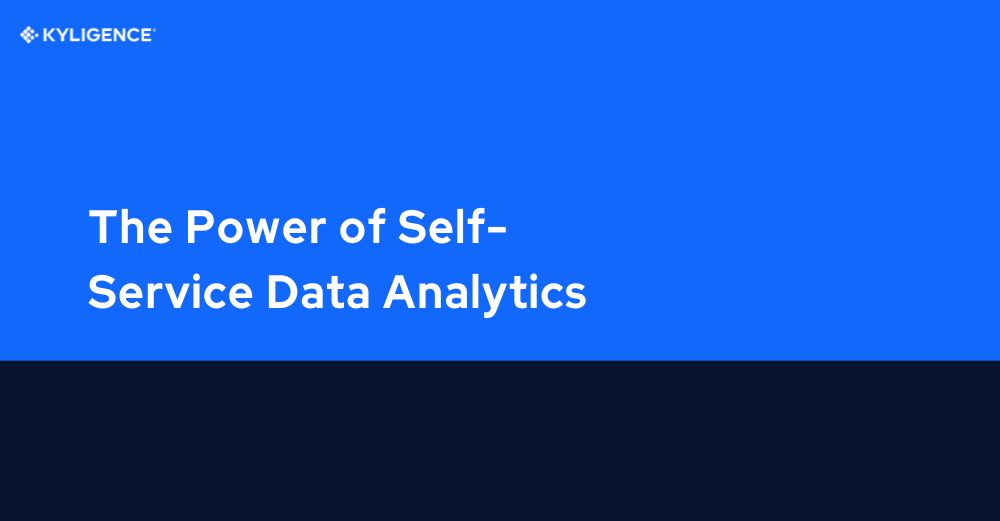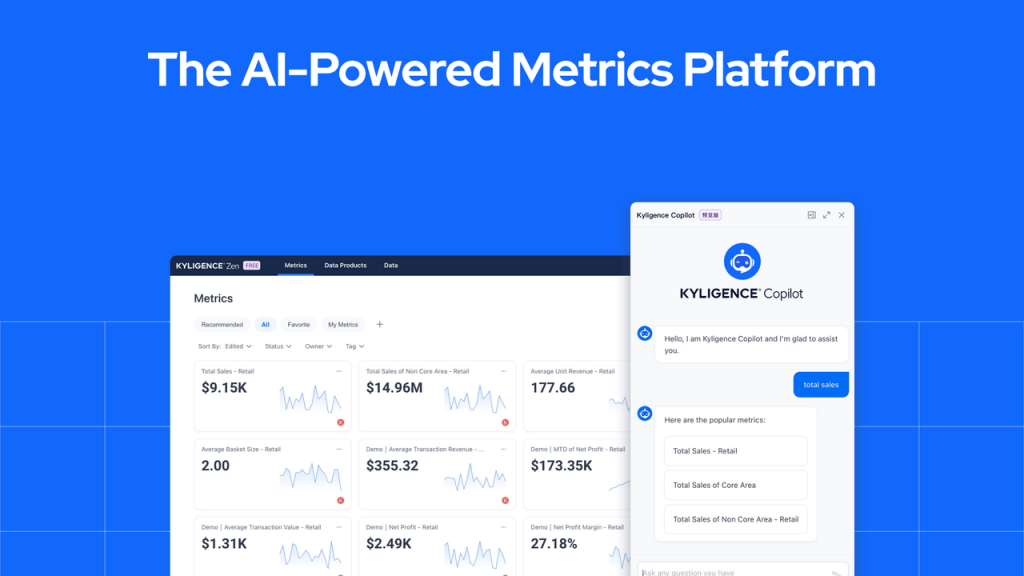Ⓒ 2023 Kyligence, Inc. All rights reserved.

Introduction
Self-service data analytics has revolutionized the way businesses analyze and interpret data. In today's fast-paced business environment, organizations need quick access to insights in order to make informed decisions.
This is where self-service data analytics comes into play. But what exactly is self-service data analytics?
What is Self-Service Data Analytics?
Self-service data analytics refers to the process of empowering users with the ability to access and analyze data without relying on IT or data professionals. It allows business professionals, data analysts, and decision-makers to explore and gain insights from data on their own, without the need for technical expertise.
Importance
The significance of self-service data analytics lies in its ability to democratize data analysis within an organization.
Traditionally, accessing and analyzing data required specialized skills and knowledge, which often led to bottlenecks and delays in decision-making processes.
With self-service analytics, users can directly interact with the data they need, enabling faster and more efficient decision-making.
Benefits of Self-Service Data Analytics
Self-service data analytics offers numerous benefits that can significantly impact businesses and empower users with valuable insights.
Here are some of them.
Provide empowerment
One of the key advantages of self-service data analytics is the empowerment it provides to business professionals and data analysts.
Traditionally, these individuals would have to rely on IT departments or data scientists to extract and analyze data for them.
With self-service analytics tools, they can take control of their own data analysis processes, saving time and reducing dependency on others.
Faster decision-making
Self-service analytics enables a faster decision-making process. Users no longer have to wait for reports or analyses from other teams; they can directly access the relevant data and generate insights in real-time.
This agility allows businesses to respond quickly to changing market conditions and make informed decisions promptly.
Data accuracy
Another significant benefit is improved data accuracy and reliability. When users have direct access to the underlying data, they can validate its quality and ensure its accuracy before utilizing it for analysis. This reduces the risk of making decisions based on incorrect or outdated information.
Continuous learning
Self-service analytics promotes a culture of continuous learning within organizations. By encouraging users to explore and experiment with data on their own, it fosters a deeper understanding of the business's operations and challenges.
This hands-on approach encourages innovation and empowers employees to uncover new opportunities or identify potential issues.
Best Practices for Implementing Self-Service Analytics
Implementing self-service analytics can be a game-changer for organizations, empowering users to access and analyze data on their own terms.
However, to ensure the success of self-service analytics initiatives, it is important to follow best practices that promote user adoption and maximize the value derived from these tools.
User-friendly interface
One crucial aspect of implementing self-service analytics is establishing a user-friendly interface. The interface should be intuitive and easy to navigate- allowing users with varying levels of technical expertise to seamlessly interact with the data.
This includes providing clear instructions and guidance on how to perform different analyses or generate reports. By designing an interface that is visually appealing and user-friendly, organizations can encourage more users to embrace self-service analytics and unlock valuable insights.
Comprehensive training
Comprehensive training and support are also essential for successful implementation. Users need to be equipped with the necessary skills and knowledge to effectively leverage self-service analytics tools.
Providing training sessions or workshops that cover basic functionalities as well as advanced features can help users become proficient in using these tools.
Additionally, offering ongoing support through documentation, online forums, or dedicated help desks ensures that users have access to assistance whenever they encounter challenges or have questions.
Data security
Data security and privacy should never be compromised when implementing self-service analytics. Organizations must establish robust security measures to protect sensitive data from unauthorized access or breaches.
This includes implementing role-based access controls, encryption techniques, and monitoring mechanisms to ensure data integrity.
By prioritizing data security, organizations can instill trust among users and encourage them to confidently explore and analyze data without concerns about privacy or confidentiality.
Collaboration
Encouraging collaboration and knowledge sharing among users is another important best practice for implementing self-service analytics.
Creating opportunities for users to share their insights, experiences, and best practices fosters a collaborative culture within the organization.
This can be achieved through internal communities of practice, where users can exchange ideas, seek advice from peers, or showcase their analytical achievements.
By promoting collaboration and knowledge sharing, organizations can harness the collective intelligence of their users and drive innovation through data-driven decision-making.
Kyligence: A Leading Self-Service Analytics Tool
Kyligence is a leading self-service analytics tool that empowers users with advanced data insights and analysis capabilities.
With its user-friendly interface and powerful features, Kyligence allows business professionals, data analysts, and decision-makers to easily access and analyze their data without the need for technical expertise or assistance from IT teams.
Benefits
Ease of Communication with Data: Kyligence Zen provides a user-friendly platform that simplifies data interaction, making it accessible even for individuals with no technical background. This ease of communication with data accelerates decision-making by providing clear insights swiftly.
AI-Powered Metrics Analysis: The platform employs artificial intelligence to enhance metrics analysis, enabling a more informed understanding of business numbers. The AI-powered analysis uncovers patterns and insights that might otherwise go unnoticed, contributing to a more robust data analytics process.
Assisted Data Interaction with Kyligence Copilot: Kyligence Copilot, an AI assistant, facilitates a conversational interaction with business numbers, allowing users to change how they use data effortlessly. This feature not only simplifies data exploration but also helps users stay on top of problems by providing timely alerts and insights

Conclusion
Businesses that embrace self-service data analytics will gain a competitive edge in today's fast-paced digital landscape.
By empowering users with insights into their own data, organizations can make informed decisions more rapidly and drive innovation within their industries.
It is time for businesses to unlock the power of self-service analytics through tools like Kyligence and take control of their own data destiny.
So why wait? Start your journey towards empowered decision-making today with self-service data analytics!
Try Kyligence free today!
See Also
Unleashing the Potential of Self-Service Data Analytics
Optimizing Productivity through Power BI Self-Service Data Visualization, Reporting, and Analytics
Delving into the Notion of Self-Service: Comprehending its Significance and Advantages
Transforming Data Analysis with Self-Service Analytics
Unveiling the Potential of AI Big Data Analytics Unknown to Many Businesses
